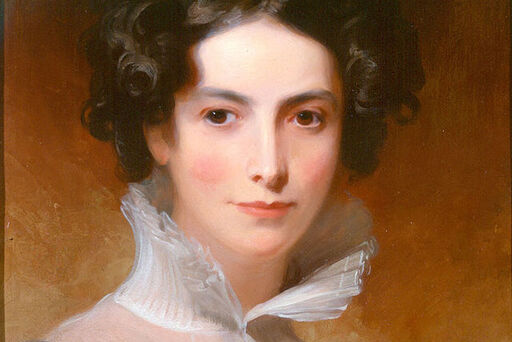Rebecca Gratz Biography

Rebecca Gratz was born on March 4, 1781, in Lancaster, Pennsylvania to Miriam Simon and Michael Gratz. Her mother was born in America; and was the daughter of Joseph Simon, a preeminent Jewish merchant of Lancaster. Rebecca’s father, Michael, descended from a line of respected rabbis in Silesia (modern Czech Republic, and parts of Poland and Germany). The Gratz brothers built a business that supported the cause of the American Revolution by signing non-importation agreements and running British blockades. They also used their business acumen to support the financial footing and future of Philadelphia’s first synagogue, Mikveh Israel. Despite their Ashkenazi roots, the Gratz family were observant Jews and integrated well into the culture and religious life of Mikveh Israel’s Sephardic congregation. The Gratz family business grew with the new United States, from Pennsylvania westward into Ohio, Kentucky, and Indiana.
Rebecca was the seventh of twelve children. Their family was close-knit: only three of her siblings married, and despite the means to live apart, Rebecca chose to live with her unmarried brothers. Rebecca took on the role of matriarch, becoming the primary caregiver of her nieces and nephews when her sister Rachel passed away in 1823. The letters in this collection, span nearly Rebecca's entire life: from age nineteen to eighty-five. These letters show her at the center of networks of family and friends, checking in on the health and well-being of her loved ones, learning about her brothers’ travels around the U.S. and the world, and chiding one another for not writing frequently enough. Rebecca and her friends also discussed politics and what they were reading, giving us rare and intimate insight into the intellectual lives of 19th century women.
Rebecca Gratz built a career by establishing and helping to run various benevolent societies. For many wealthy women of the 19th century, contributing to benevolent societies allowed women to work within the constraints of patriarchy to carve their own spaces of power. Rebecca began working in existing women’s organizations alongside her mother and sisters, but over time she realized that “secular” charities would proselytize Christianity to those they helped. This did not prevent Rebecca from supporting these groups, but it did prompt her to create her own Jewish societies so that indigent Jews would not need to suffer a double indignity of poverty and the pressure of conversion.
In this vein, Rebecca founded an orphanage to provide homes and security for children orphaned by the War of 1812. In 1838, she led in founding the Hebrew Sunday School Society, giving Jewish women a distinct and public role in teaching religion for the first time. This laid the foundation for all Jewish congregational education in North America. Rebecca’s new institutions gave Jewish women independent, public, and leadership roles in philanthropy and religious education
Rebecca Gratz believed in the potential of all three aspects of her identity: an American, a Jew, and a woman. Putting them together to help others achieve religious freedom, educational advancement, and freedom from poverty and indentured servitude, Rebecca was a role model to many women across the world for her vision and leadership in education and charitable work. She may also have inspired her brother Hyman to leave a bequest in his will for the founding of Gratz College (est. 1895) as the first independent college of Jewish studies in North America and the first Jewish institution to accept women as students alongside men.
Rebecca's fierce commitment to her family and to the Jewish people left a legacy both within the Gratz Family and the broader American Jewish community.